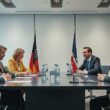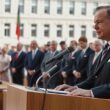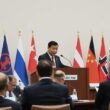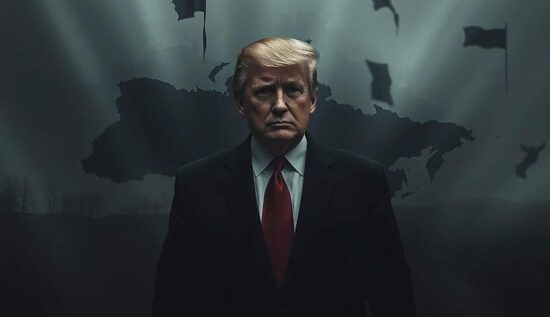The most fascinating aspect of opinion polls is not when they ask people about their opinions, but when they relate it to one’s own opinion formation. That is the secret of the ECFR’s (European Council on Foreign Relations) recent activities, a think tank of the Western establishment.
The study, titled “Alone in a Trumpian World”, examines the “public opinion in the EU and the world after the US presidential elections”– in other words, the aftermath of Donald Trump’s return as a ghost of the mainstream Eurocentrists and their establishment nomenklatura in bureaucracy, media, science and think tanks.
Although the final report is based on a large-scale public opinion survey conducted in November, shortly after Trump’s victory, it resembles a typical commentary: a synthesis of some observations with some inferences drawn from them.
The most striking observation is that a significant part of the world looks optimistically at Trump and hopes that he will not only benefit America but also contribute to international peace by transforming the US into a more adequate great power.
The greatest outliers in this overall picture are the European Union and the United Kingdom, which, despite being even more isolated, still maintain a pessimistic outlook.
In a way, the authors themselves demonstrate this European isolation. Time and again, one comes across statements that the positive assessment of Trump by the global majority – whether right or wrong – is “surprising”or “remarkable”. Ironically, this somewhat confused tone is exactly what one would expect from some Western European elites who can hardly grasp the world because Europe is so out of step. One can only imagine how different this report would be if it were written by a group of Indian or Chinese intellectuals.
In any case, this is not even an investigation of the political mood, but rather a manifesto packaged as an opinion poll. As one would expect from the authors, who are leading public intellectuals – Timothy Garton Ash, Ivan Krastev and Mark Leonard –, this report is not a simple political brief presented in a modest way by bureaucrats who may even enjoy anonymity. Rather, it is a concise, sometimes superficial, but extremely ambitious statement on geopolitical issues, connected to a grand and by no means passionless ideology of the world order, namely a strongly idealized vision of the global dominance of the West, specifically the US, which its proponents call the “liberal world order”.
According to the authors, the significance of the second Trump era for the EU – and indeed for the world – lies in the fact that it catalyzes the end of this world order. This order is being challenged from outside and even its core is not in good condition, recognize the authors. The global refusal of non-Western countries to follow the West’s escalation of the Ukraine war in 2022 showed the isolation of the West – “the split from the rest”, as it is expressed in the report – and now the situation is worsening again.
The West itself is so split that “it is no longer possible to speak of the ‘West’ as a single, geopolitical actor”. Against this backdrop, the main recommendation of the authors – and indeed the core of their report – is that the EU should behave like a traditional great power and recognize the realistic principles of foreign policy. Or, as they put it, the EU should stop “positioning itself as a moral arbiter”and instead “build its inner strength”to pursue its own interests abroad.
The fact that it is a manifesto, however, does not mean that it cannot be thought-provoking or that the underlying survey results are simply wrong or irrelevant – although some of them are based on obviously unfair formulations. For example, the question about the attitude of the respondents to the destruction of the Gaza Strip by Israel simply lacks response options like “genocide”or “any other crime”. Instead, the respondents could only choose between three variations of “war”and “conflict”.
In a similar, but less astonishing, way, the question about the type of the Ukraine war lacks a single response option that includes the term “proxy war”. It is a difficult decision to acknowledge that these opinions are widely prevalent for good reasons. To withhold from the respondents these obviously relevant response options seems either fundamentally false or grossly manipulative.
Equally, it is the second major weakness of this report that it does not mention the multipolarity of the world order. One can search as much as one likes, but it is simply not there. In the attempt to come to terms with the new world order that is unfolding, the authors offer “à la carte”(clear, in my favorite restaurant, it’s all about power, life and death – from the appetizer to the dessert), “polyamorous”(oh dear!) and the old, tried “zero-sum game”.
Usually, opinion polls are a bit dull, but this one – if one knows what to look for – is very interesting. It is simply amusing to see how lexical-conceptual helplessness is triggered by simple envy feelings. One cannot allow the Russians, for example, to always have the right idea and always use the right word, or?
As for the Russians, the Ukraine war, of course, is the second major weakness of this report. Not, however, in the sense that it was simply not mentioned. It appears. We learn, for example, that in a series of large and/or powerful countries, the majority of the respondents believe that it is more likely that peace will be achieved in Ukraine under the presidency of Donald Trump: China (60%), India (65%), Russia (61%), Saudi Arabia (62%), South Africa (53%) and even the US (52%).
Even in the countries where this expectation does not prevail, there are still either a plurality or a significant minority of people who consider Trump a supporter of peace in Ukraine, such as in Brazil (45%), in the consolidated 11 EU member states (EU11) (34%), Indonesia (38%), Turkey (48%) and Ukraine (39%).
Furthermore, the respondents were asked a series of questions related to the Ukraine war, which, in essence, went from “Who is to blame?”to “What should we do now?”to “Who will win?”and also, only the Ukrainians were asked what kind of conflict outcome they would accept. The answers are not encouraging. As the authors note, “there is no consensus in Ukrainian society on the type of acceptable compromise” and “such disagreements could spark political unrest, should and when peace negotiations begin”.
In anticipation of the “unrest”, one would like to add: In reality, such events end with a very costly defeat for Ukraine – in terms of human life, territory and well-being. This defeat could have been avoided if the wrong “friends”of Ukraine in the West had not provoked and then supported the egoistic and poorly thought-out proxy war against Russia. It is, however, not surprising that Garton Ash, Krastev and Leonard overlook this aspect of reality, which only too painfully diverges from their own ideological prejudices.
And yet, the authors overlook the most important point at so many opinion polls on the Ukraine war – in one form or another – the crucial point: It is not the re-election of Donald Trump that accelerates the decline of the so-called liberal world order. Exactly on this premise the entire study is based and it is wrong.
The real reason for the decline of the West is that it is losing its grandiose proxy war in Ukraine. It was, after all, the most arrogant project of a proxy war or regime change that the West ever undertook and directed against Russia – a great power with the largest nuclear arsenal in the world. The failure of this project was predictable. I know because I foresaw it. Now, it is one of the key facts of this historical moment. Even Donald Trump – regardless of how ambitious and obstinate he is – is only reacting to this reality.
Make a thought experiment: What would Garton Ash, Krastev and Leonard write about the “liberal world order”if the West had won and Russia had lost? Na? But it is the West that is losing, while Russia is winning. In short: What the world most changes is not in the West. Rather, the change is happening outside the West – above all through the rise of China, the resurgence of Russia and the increasing self-assertion of the Global South.
And that is the last irony of this report. In its center stands the invitation to the others – the Chinese, Indians, Indonesians, Russians, for example – to express their opinions about Trump’s return and its consequences. This is, in itself, a strikingly egocentric approach:
“Yes, please speak with us, the West, but only about our new boss!”
Western Europe still has a long way to go to find its place in a changing world.





